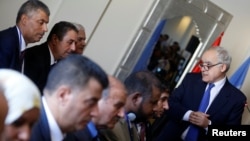The United Nations began a new push on Tuesday to stabilize Libya by getting rival factions to revise the stalled peace plan and set the country on the path to elections.
The effort aims to end the turmoil that developed in Libya after the 2011 NATO-backed uprising ended Moammar Gadhafi's 42-year rule, giving space to Islamist militants and smuggling networks that have sent hundreds of thousands of migrants to Europe.
Political and military fractures have left the country mired in conflict and the OPEC member's economy in freefall. Rival parliaments and governments have vied for power.
Last week, U.N. envoy Ghassan Salame announced a one-year "action plan" for a transition towards presidential and parliamentary elections.
The plan got underway on Tuesday with negotiations between delegations from rival parliaments from eastern Libya and Tripoli, which are meant to draw up amendments to a previous U.N.-mediated plan signed in December 2015.
As the delegations convened in Tunis, Salame said he hoped the amendments could be agreed rapidly and that he sensed a "window of opportunity" for reconciliation.
"All Libyans are fed up. They are going from transition to transition with no horizon," he said. "We have sleeping institutions that need to be awoken, divided institutions that need to be united, and hijacked institutions that need to be rebuilt."
The 2015 deal has only had limited support from power-brokers and was never endorsed by factions aligned with military commander Khalifa Haftar that control eastern Libya.
Haftar, who has been courted by Western states after making military gains, was in Rome on Tuesday where he met Defense Minister Roberta Pinotti and Italy's highest ranking military officer, Claudio Graziano.
Pinotti expressed hope that all parties would support Salame's "inclusive political strategy ... excluding any military solution", according to a defence ministry statement.
Italy and other Western states have tried to work with the U.N.-backed Government of National Accord (GNA) in Tripoli, but it has been hamstrung by internal splits and has been unable to halt a slide in living standards or tame the power of armed groups.
"We're here to move the political process forward for the sake of the country's stability," said Moussa Faraj, head of the delegation from the High Council of State in Tripoli, according to a tweet from the United Nations from the Tunis meeting which got closed to the press after Salame's speech.
Under the new U.N. plan, once amendments have been agreed a national conference drawing on a much larger number of representatives from across Libya is meant to approve the members of a transitional government that would run the country until elections.
The eastern parliament, or House of Representatives (HOR), is expected to devise laws for national elections and for a referendum to approve a much-delayed constitution. The chamber has barely functioned over the past two years and has been boycotted by a large number of its members.
"Our task is difficult," said Abdusalam Nasia, head of the HOR delegation, according to the United Nations. "I call on all to leave personal interests behind and focus on common interests."
Additional reporting by Steve Scherer in Rome; Writing by Aidan Lewis; Editing by Angus MacSwan/Jeremy Gaunt








